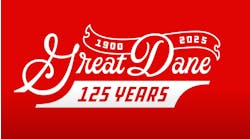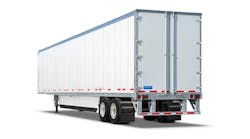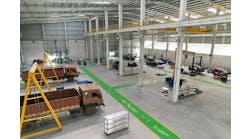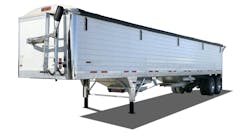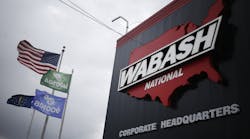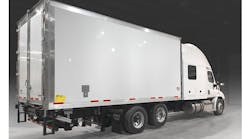Wabash National Corporation on Wednesday reported record first-quarter sales and an improved operating margin as the company continues to find ways to offset a “challenging” manufacturing environment. Wabash also showed substantial, better-than-expected gains in its Final Mile Products business on growing demand and improved effectiveness of the former Supreme plants, along with better chassis availability.
“We are off to a good start in 2019, with the first quarter coming in slightly ahead of our initial expectations," said Brent Yeagy, president and chief executive officer. "Although the manufacturing environment remains challenging, the operating decisions and commercial strategies that we launched last year to offset these pressures pulled through as expected in the form of a sequential increase in margins. We expect that our execution of the Wabash Management System will allow us to continue to deliver on our guidance for improved margins in 2019.”
Net sales for the first quarter increased 9 percent to $533 million, while each of the company’s three segments contributed to top-line growth as market demand remained strong, according to the report. The company achieved an operating margin of 4.7% during first quarter 2019, which represents an improvement of 100 basis points sequentially from the fourth quarter of 2018.
Operating income was $25.2 million in the first quarter, while net income was $14.8 million. Operating EBITDA, a non-GAAP measure that excludes the effects of certain items, was $38.3 million, or 7.2% of net sales.
Wabash shipped 12,400 new trailers in the quarter, down slightly from 12,650 new trailers in Q1 2018.
Backlog reached $1.6 billion at the end of the quarter, a 29% increase from a year ago, Yeagy noted, and trailer build schedules are “effectively filled” for the remainder of the calendar year.
“Industry volumes are proving to be strong in 2019, as reflected by the strength of our backlog,” Yeagy said. “We continue to work diligently to mitigate the operational and supply chain headwinds that accompany such high levels of demand.”
Among the Wabash business segments:
- Commercial Trailer Products’ net sales for the first quarter increased $13.6 million, or 4.2 percent, to $341 million. Gross profit margin for the first quarter decreased 70 basis points as compared to the prior year period primarily due to the impact of higher material costs and supplier disruptions.
- Diversified Products’ net sales for the first quarter were $100 million, an increase of $4.4 million, or 4.7 percent, as compared to the prior year, due primarily to increased demand for liquid tank trailers. Gross profit and profit margin as compared to the prior year period increased $2.8 million and 200 basis points, respectively, as pricing initiatives took hold to recover cost increases from the prior year.
- Final Mile Products’ net sales for the first quarter totaled $101 million, an increase of $25.4 million, or 33.6 percent, as compared to the prior year, due to market strength and the operational and technology advantages Wabash brings to the truck body space. Gross profit margin for the first quarter decreased 190 basis points as compared to the prior year period primarily due to product mix as well as higher wage costs.
Looking ahead
In a Q&A session with investment analysts, Yeagy explained that the company’s product mix would protect it from a shifting supply chain and the move to more regional and local delivery. Indeed, he doesn’t anticipate a significant “cannibalization” of the highway trailer market, but rather an “expansion in the overall need for assets within the changing logistics model.”
“From a Wabash perspective, regardless of where that trend goes, effectively it's just a swing of revenue for us,” he said. “We're positioning product across the board to fulfill whatever need is present within the logistics models. We're the only [company] that can serve the first, middle and final mile.”
Similarly, the electrification of commercial vehicle powertrains is less of a concern than an opportunity for improved product designs and the company’s molded structural composites technology.
“As we look at the electrification—we'll call it clean energy utilization—within the chassis or truck front, there may be modifications that we make to the trailer or truck body to facilitate anything additional, whether it be auxiliary solar, whether it be batteries for storage. Whatever those things may be, it's the total weight of the unit that matters. Our product can then facilitate that added weight that will come within the tractors and in chassis as a whole. So, we see that as a potential advantage and we are investigating and preparing accordingly.”
Indeed, the company’s wide product range and investment in new materials have the attention of Wall Street. Stifel Transportation Equipment Analyst Michael Baudendistel calls the first quarter report “a clean beat,” meaning the performance was better than expected after all the numbers were crunched. Following the Q1 release, Stifel increased its earnings and price projections for Wabash for 2019 and 2020.
“The Final Mile segment is one to watch, which gives the company an avenue for growth that is outside of the semitrailer production cycle,” Baudendistel writes in a note to investors, and he suggests that Wabash is managing the segment to grow volumes first and then work to expand margins “later on.”
Similarly, Stifel says the company is “ready to face the new electrification trends” and that there shouldn’t be any disruptions to the business, “as was expected.”
“We are confident that the company’s dry van and storage technologies can accommodate any increases in truck weight and believe the company’s engineering talent and R&D division could seize the opportunity to further differentiate the products,” Baudendistel writes.
